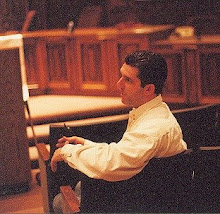We've had an extraordinary run of good fortune recently. Most of the loans we are working on are proceeding fairly smoothly. Most of our clients are people with good credit and verifiable income. Our investments appear to be paying off. Everyone is out of the hospital. Stuff like that.
On a personal note, some of you know that I have been aggressively working on my fitness for the past 7 months, mostly to get ready for basketball season, which is my sport of choice. I've run some 5ks, things like that. The last two years I have been unable to play ball, due to ripping a tendon in my ankle two years ago (on the very first day of the year) and tearing my ACL (opposite leg) last year in a freak accident that I still can't completely understand. Yesterday was game 3 of the season, and I am, currently, averaging about 20 points a game and leading the league in 3-point shooting. At 37.
So of course I tore my ankle up again. It is the same injury as last time, which took me roughly 6 months to recover from. This time I can go see a doctor, which I will do, but I am right now predicting that I can spend practically whatever I want and get exactly the same results as two years ago. So far we're out $275 for a doctor visit and some x-rays, which showed nothing whatever of any practical value. It does appear that I have broken my ankle before, but that must have been someone else's ankle, because I'm sure I would have remembered. But that's what the x-rays show.
So if I'm a little testy the next few days, or slow to return phone calls, it's because I am bitter at the entire universe. That, and I have to hop (on the leg with no ACL) to reach the phone. Laugh if you must.
The yield-curve inversion has grown so deep that it looks like a horse trough. The 2-year bond is above both the 5- and the 10-year, and the 6-month bond is almost a full tenth of a point in yield above the 5-year. It's just completely screwed up. Practically speaking, for those just joining us, this means that the 30-year fixed mortgage rate is about where it has been for the last three years, right around 6%, but the ARM rates have skyrocketed to the point that there's almost no reason to do any other loan than the 30.
So who is right? The Fed thinks interest rates should be higher than they are. By the Fed, I mean the seven members of the
Fed Board of Governors, who are the ones that set the Fed Funds Rate, from which the Prime Rate is derived. This group of seven, led by Alan Greenspan, have raised rated fourteen consecutive times, at 1/4 each time. This means a cumulative rise in short-term rates of 3.5%, from 1% to 4.5%, making the Prime Rate 7.5%. During this time, the cumulative wisdom of the bond traders is that the Fed Governors are completely nuts. The long bond (10-year bond) is trading almost exactly where it was three years ago before the rate hikes began. What this means, in effect, is that bond traders think the risk of inflation is less for a 2-year bond than for a 6-month bond, and MUCH less for a 5-year or 10-year bond. This is impossible, naturally, because whatever rise in interest rates affects the 6-month bond must affect any bond with a longer maturity, by definition.
What this means is that the Fed has taken short bonds off the market. They are ridiculously priced, to the point that if you're going to sink cash into the market, you'd be better off putting it in a savings account than into a short-term bond. The short bond price continues to fall (driving up the yield), because there is no price that would make it attractive to an investor. Meanwhile bond traders can't get enough of the longer bonds, so their yields fall while their prices rise.
The Fed thinks inflation is a problem, so it raises rates to reduce the monetary supply. Bond traders keep pumping liquidity in by buying longer bonds. One of the two is wrong. Which one?
The guys at the Fed are bright. These are not dumb people. But no group of seven men, no matter how intelligent they are, are smarter than several million people together. You can get more on this from James Surowiezki's
The Wisdom of Crowds, which I heartily recommend, but suffice it to say that the Fed is wrong. And in order to forestall a recession, it will have to cut rates again. You heard it here first.
What does this mean to you? Not much, except that for the moment, you cannot use the more aggressive mortgage loans to provde low payments, unless you are willing to back that low payment with the equity in your house, and absorb some of the unpaid interest into your outstanding loan every month. It just reduces the options available to homeowners and investors, and this reduction is due to one person, and one person only: Alan Greenspan. You have him to thank that your payment is $150 higher than it should need to be.
The Broncos will beat the Steelers, and it will not be close. The Panthers will beat the Seahawks, and it will be.
Have a good weekend. I'll try to summon up a positive mental attitude by Monday.

